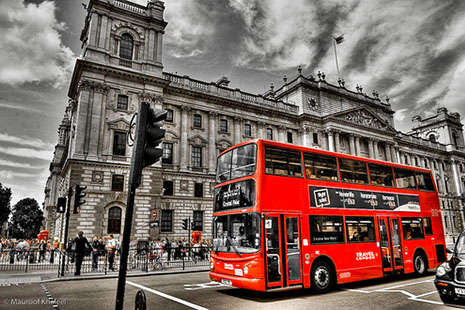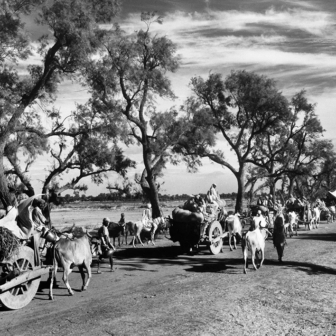SOME YEARS AGO, when I was a fellow in a Cambridge college for a few months, I met a very pleasant man, Alan Whitehouse, who was (and remains) a BBC transport correspondent in northern England. He’s an expert on rail. I recall being mightily impressed that the BBC had such a specialised post – in fact, they seem to have several transport specialists – but I’ve since realised that it simply reflects the significance of transport in general, and public transport in particular, in Britain.
Perhaps better known and certainly more infamous than my dinner companion is a man named Richard Beeching. In 1966, as chair of the British Railways Board, Dr Beeching was responsible for axing 4000 miles of British railway track. The phrase “the Beeching Axe” is still occasionally heard in this country; although it’s not quite as much of an historical landmark as, say, the Norman Conquest or the execution of Charles I, it’s recalled as a significant moment in the making of (post)modern Britain.
While many rural communities in Australia have been devastated by the decline of rail over the years, there is no equivalent in Australian popular memory of Dr Beeching or his axe. And while the many failings of public transport in Sydney might well be a stick – as if there were any shortage of them – with which to beat the Carr/Iemma/Rees/Keneally government of New South Wales, it’s hard to imagine the disruption of just a single line being quite the story it is in London. Plans to close the Northern line for maintenance each weekend for more than a year recently made front-page headlines in the Evening Standard. An increase in public transport charges – as in the recent rise of a standard bus fare from £1 (A$1.80) to £1.20 – is always big news, for a day or two at least. And when Londoners decide where to live, the cost of public transport will be factored carefully into budgets, with the potentially much higher cost of a long or complicated journey weighed up against the money saved and floor- and garden-space added by living further from the centre of town.
In fact, apart from the weather it’s hard to think of anything so woven into the fabric of most people’s everyday lives as public transport. The long commute, usually by train or bus, is a way of life for many Britons, and especially for Londoners. Just as outback Australians are fabled for regarding a 500 kilometre journey as “just up the road,” so some Londoners treat a ninety-minute or more journey to and from work as a routine affair. They simply stick their noses in some reading – perhaps a chunky paperback or one of the free giveaway papers or magazines distributed outside many Tube stations – and let the world pass by. Several of my own colleagues here on the Strand live in or near Cambridge, an expensive forty-five-minute express ride station-to-station; but few people live or work right next to railway stations, so they, too, would spend a solid ninety minutes or more travelling each day. A late evening or early morning work engagement in London usually means a night in a guest house or, for the better-off, a small flat tucked away somewhere in this sprawling city. Balancing work and family in these circumstances can be quite a juggling act.
About private transport, too, there are fierce debates, made even more fierce by the increasingly fraught issue of climate change. The congestion charge – introduced by the former mayor of London, Ken Livingstone, in 2003 – has changed the feel of the city. Drivers must now pay £8 for the privilege of driving a car into the centre of the city on weekdays between 7am and 6pm, and this means that central London is dominated by taxis and buses to a much greater extent than when I first lived in Britain a little over a decade ago. This is partly because the introduction of the measure was accompanied by an increase in the number of buses on the road – the money raised by the congestion charge is supposed to fund investment in public transport – so that one of London’s most recognisable images, the red double-decker, is ubiquitous on virtually every thoroughfare.
While the charge was once opposed by conservatives and is still controversial in its effects, London seems a more pleasant city for these changes. Although the current Conservative mayor, Boris Johnson, has decided to abolish the western extension of the zone to Chelsea and Kensington introduced by his predecessor in 2007, the original boundaries remain in place and are now more or less taken for granted. The charge will rise to £10 with the abolition of the extension, but Johnson decided that a higher charge of £25 for heavy-polluting vehicles, to which Livingstone was committed, would not go ahead. Labour critics sniffed class warfare here, a case of the Tory mayor protecting the London equivalent of the Toorak tractor.
We’ve never even contemplated buying a car of any kind in London, and I can think of few occasions – except the occasional shopping trip to the likes of Ikea – when we would have much benefited from having one. It would be useful, occasionally, for a weekend out of town, but many people in our situation hire cars for such occasions, or even join a car club that allows them to pay a subscription and then acquire a car for casual use fairly cheaply. We use buses as far as possible, the Tube fairly regularly but less often – mainly because it’s dearer – and overground trains and river ferries hardly at all. And many Londoners ride bicycles, dorky-looking foldable things that, child of the BMX era as I am, I can only look on with amused contempt.
In fact, I can only think of one friend who uses a car to get to work in central London. He lives in exclusive Primrose Hill and is a partner in an investment bank which provides him with a parking space. And he drives an electric car which, like vehicles that use alternative fuels, is exempt from the congestion charge. Most ordinary mortals, of course, couldn’t afford regular city parking even if they didn’t have to pay the charge. When I first arrived in London, I recall seeing a real estate advertisement that seemed to be offering a flat at a fairly reasonable rental; it was actually offering a car park space. One newspaper recently reported that some home-owners are earning as much as £7000 a year by hiring out their driveways for parking.
I take my young daughter to her nursery on the bus – a twenty-five or thirty-minute ride from our home in peak hour – and it can be a trial, but a minor one. For some reason, buses are more friendly places than the Tube. Perhaps it’s partly because you see at least some of the same faces regularly if you catch the same bus each day. One of my students told me that on the Tube you never speak to a stranger, or even someone you half-recognise; it’s a kind of local etiquette. And I think he’s right – so much so that there was a rather bizarre column in a now defunct giveaway newspaper that basically involved people asking other people for a date on the basis of having seen them on the train. If you’re going to go to the trouble of placing a personal ad, you’d think that you might also be capable of striking up a conversation on the Underground.
Buses can be crowded, but considering the size of London and the vast scale of the whole operation they are less busy than I expected. While we sometimes have to stand, it’s very unusual if at least one passenger doesn’t offer my daughter a seat. Even in the recent snow, the buses on our route held up well. Sometimes, especially when I’m commuting alone, I catch the Tube, but it’s an expensive habit – prices for Zone 1, the inner city, rose from £1.60 to £1.80 a trip earlier this year. And getting off at the stop closest to home, Holloway Road, on an evening when Arsenal is playing at home is something that anyone with an ounce of common sense will do their best to avoid.
For the most part, London is a city that works pretty well for its commuters. An Australian friend based here recently revisited his hometown of Perth and, forgetting that he wasn’t in London, became impatient at the “long” wait for a bus. There’s something admirable about the tolerance, patience and courtesy that most people show one another in the remarkable business of transporting millions of Londoners from their homes and back again each day. These modest virtues can be overlooked or taken for granted until something like the London bombings comes along to challenge the delicate balance of self-interest and regard for others that helps make them possible. •




